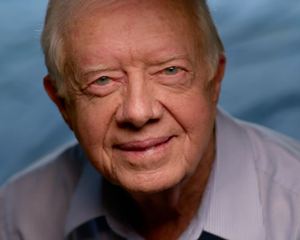It was pure Jimmy Carter: gentle in tone, pragmatic in approach, and deferential to changemakers working to improve the world for all.
這是純粹的吉米·卡特:語氣溫和,方法務實,并且尊重致力于改善所有人的世界的變革者。
But characteristically, it downplayed the president's own contributions to making the world a better place -- contributions that not just changed the world but may have saved it.
但其特點是,它淡化了總統本人為讓世界變得更美好所做的貢獻--這些貢獻不僅改變了世界,而且可能拯救了世界。
Here are just three of the ways the soft-spoken Georgia peanut farmer changed the world for the better.
以下只是這位說話溫和的佐治亞州花生農民讓世界變得更美好的三種方式。
1. He helped avert a nuclear disaster in Canada
1. 他幫助避免了加拿大的核災難
Born James Earl Carter, Jr., on October 1, 1924, Carter grew up in small-town Georgia before joining the U.S. Navy as a submariner and officer.
卡特出生于1924年10月1日,原名小詹姆斯·厄爾·卡特,在佐治亞州的一個小鎮長大,之后加入美國海軍,擔任潛艇兵和軍官。
The promise -- and peril -- of nuclear weapons would go on to define his career.
核武器的前景和危險將繼續定義他的職業生涯。
Tasked with helping develop the nation's first nuclear submarine program, the future president was deeply involved in a technology that would prove vital throughout the Cold War and beyond.
這位未來的總統肩負著幫助開發國家第一個核潛艇計劃的任務,深入參與了一項在整個冷戰期間及以后都至關重要的技術。

But in 1952, he got up close and personal with the technology's dangers when he oversaw the cleanup of a partial nuclear meltdown at an experimental plant in Ottawa, Canada.
但在1952年,當他監督加拿大渥太華一家實驗工廠部分核熔毀的清理工作時,他近距離接觸了該技術的危險。
During the meltdown, millions of gallons of radioactive water filled the reactor's basement in the wake of a partial rupture of fuel rods in the plant.
在熔毀期間,由于核電站燃料棒部分破裂,數百萬加侖的放射性水充滿了反應堆的地下室。
Thanks to his top-secret training, Carter was one of just a handful of people cleared to address the meltdown.
由于接受了絕密訓練,卡特成為少數獲準解決這場危機的人之一。
The assignment came with plenty of peril: After mapping out their moves on a dummy of the plant built on a nearby tennis court, Carter and his colleagues would be lowered into the reactor for a short period of time each.
這項任務充滿了危險:卡特和他的同事們在附近網球場上建造的工廠虛擬模型上制定了行動計劃后,他們將分別被放入反應堆中一小段時間。
"We worked frantically for our allotted time," Carter recalled in his 1975 campaign biography, Why Not The Best? "We had absorbed a year's maximum allowance of radiation in one minute and twenty-nine seconds."
“我們在規定的時間內瘋狂地工作,”卡特在1975年的競選傳記《為什么不是最好的?》中回憶道。“我們在1分29秒內吸收了一年最大允許輻射量。”
The future president's urine and feces were radioactive for months.
這位未來總統的尿液和糞便在數月內都帶有放射性。
But, he wrote, "There were no apparent aftereffects from this exposure -- just a lot of doubtful jokes among ourselves."
但是,他寫道,“這次曝光并沒有產生明顯的后果--只是我們之間產生了很多可疑的笑話。”












